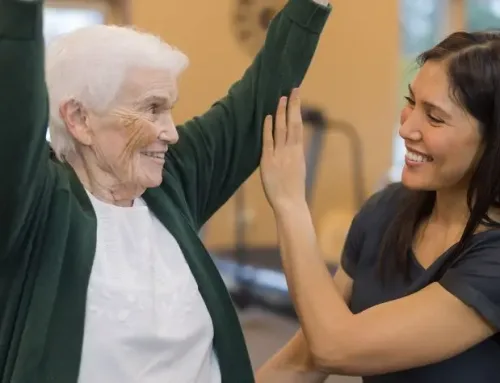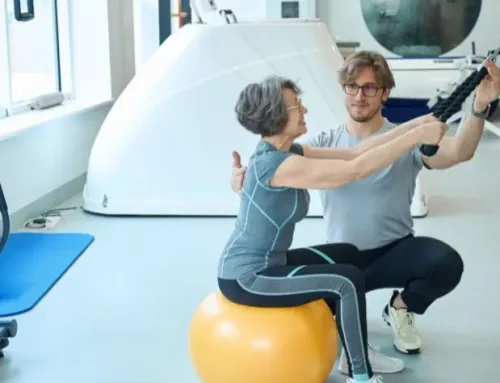Occupational Therapy Career Path: Specializations and Advancement

Occupational therapy is a field defined by its breadth, stretching into classrooms, clinics, research labs, and communities, with room for meaningful career growth at every junction. At SCU California campus, our Doctor of Occupational Therapy program is designed to support each phase of your journey, from entry-level practice to leadership and specialization.
Moving forward in an OT career is about choosing the right specializations, earning advanced certifications, and stepping into leadership roles. Whether you’re just starting out or looking to elevate your career, there are plenty of ways to turn your passion into a thriving profession. Let’s break down what a career path in Occupational Therapy looks like, from your first job to becoming a leader in the field.
From Entry-Level to Expert: The Occupational Therapy Career Journey
Getting Started: Entry-Level Occupational Therapist
After earning a Master of Occupational Therapy (MOT) or Doctor of Occupational Therapy (OTD) and passing the NBCOT exam, new grads step into entry-level OT roles.
- Work settings include hospitals, schools, outpatient clinics, and skilled nursing facilities, where clients across the lifespan are seen for OT services..
- The focus is on building clinical skills, gaining mentorship, working with diverse patient populations, and gaining real-world experience.
- Early career OTs may start residency programs to refine their skills in specialized areas.
This is the foundation stage where therapists learn, adapt, and figure out what areas of OT spark their passion before moving into specialization.
SCU’s OTD program is designed to help students begin their careers with confidence. With an accelerated hybrid format, no bachelor’s degree required for admission (90+ credits accepted), and a focus on practical experience through campus intensives and fieldwork, students begin developing real clinical skills from day one.
Mid-Career Growth: Specialization & Certification
After a few years in the field, many OTs narrow their focus and pursue specialty certifications that open doors to higher-paying, more specialized roles.
Popular OT specializations include:
- NICU OT
- Neurological Rehabilitation
- Hand Therapy
- Mental Health OT
- Assistive Technology & Adaptive Equipment
This stage is about honing expertise and gaining recognition in a specific OT niche, making it easier to stand out in the field.
Advanced Career Paths: Leadership, Research & Teaching
With years of experience and additional education, OTs can step into leadership roles, academic positions, and entrepreneurial ventures. Some options include:
- Clinical Leadership – Becoming a Director of Rehabilitation or Clinical Manager in hospitals or rehab facilities.
- Academia & Research – Teaching at universities, leading OT research, or working as a Principal Investigator on studies.
- Entrepreneurship – Opening a private practice, consulting, or developing OT-related products and technology.
For many of these roles, an OTD is often preferred or required, as doctoral training includes leadership, policy, and research components that prepare OTs for higher-level responsibilities.
SCU’s OTD curriculum addresses these higher-level competencies directly, with dedicated coursework in healthcare policy, leadership, and evidence-based research. Small classroom sizes give access to one-to-one faculty mentorship, and immersive capstone projects give students the tools to shape new programs, influence health systems, and guide the next generation of OTs.
OTD vs. MOT for Career Growth
Both an MOT and OTD can lead to a fulfilling OT career, but when it comes to long-term growth, an OTD offers extra advantages.
Many leadership, research, and academic roles favor or require an OTD, as it includes advanced coursework in policy, innovation, and program development. While an MOT is still a great entry point, OTs looking to future-proof their careers or move into higher-level positions may benefit from earning an OTD.
7 OT Specializations That Offer Exciting Career Opportunities
Occupational therapy isn’t a one-size-fits-all career. While many OTs start in general practice, specializing can open doors to higher salaries, advanced roles, and exciting new challenges. From helping stroke survivors regain mobility to designing adaptive technology, specializations allow OTs to focus on the areas they’re most passionate about.
Clinical Specializations in OT
Hand Therapy & Upper Extremity Rehabilitation
Helping patients recover from hand and arm injuries requires a deep understanding of musculoskeletal function and rehabilitation techniques. Hand therapists work in outpatient orthopedic clinics, hospitals, and rehab centers, treating fractures, nerve injuries, and post-surgical conditions.
Neonatal Intensive Care Unit (NICU) OT
NICU occupational therapists support premature and medically fragile infants in hospital neonatal units. They help stabilize sensory development, improve feeding and motor skills, and support families during the early, critical stages of life. NICU OTs work closely with nurses, neonatologists, and parents to promote growth and developmental outcomes in high-risk newborns.
Neurological Rehabilitation & Stroke Recovery
Neurological OTs assist patients with spinal cord injuries and neurological disorders like Parkinson’s. They focus on motor recovery, cognitive rehab, and adaptive strategies to help patients regain function.
Emerging & Specialized OT Fields
Mental Health & Behavioral Therapy
Occupational therapy plays a vital role in mental health recovery, helping individuals with PTSD, depression, anxiety, and addiction rebuild daily routines and independence. These OTs commonly work in psychiatric hospitals, correctional facilities, and VA clinics.
Geriatric & Aging-in-Place Therapy
As the aging population grows, so does the demand for OTs who specialize in mobility, dementia care, and fall prevention. These OTs help seniors stay independent in their homes or transition smoothly into assisted living.
Assistive Technology & Adaptive Equipment Design
Some OTs work in technology-driven fields, creating customized wheelchairs, prosthetics, communication devices, and smart home adaptations for people with disabilities.
Ergonomics & Workplace Injury Prevention
Workplace OTs help companies reduce injuries from repetitive tasks and poor posture, ensuring employees work in safer environments. They focus on ergonomic design, injury prevention, and workplace modifications.
No matter where your interests lie, occupational therapy offers a wide range of specializations that let you shape your career to fit your passion. Whether you love working with kids, helping patients adapt to neurological conditions, or designing cutting-edge adaptive technology, there’s a specialization that’s perfect for you. If you’re looking for a career path that’s fulfilling, dynamic, and always evolving, OT has countless ways to grow and make a lasting impact.
Certifications for Career Advancement
A career in occupational therapy is anything but stagnant—there are countless ways to grow, specialize, and take on new challenges. From earning advanced certifications to pursuing leadership roles, let’s explore how you can stay ahead in the evolving field of OT.
Earn Advanced Certifications & Pursue an OTD
At SCU, the Doctor of Occupational Therapy (OTD) program incorporates opportunities to earn additional credentials as part of the curriculum—giving you a professional edge without needing to enroll in separate programs.
- Our Physical Agent Modality (PAM) coursework can be applied toward California state certification, preparing you to use therapeutic tools like ultrasound, electrical stimulation, and thermal modalities in clinical settings.
- Our Wellness & Lifestyle Health course meets the 10-hour conference requirement for the American College of Lifestyle Medicine (ACLM) Certification Exam, supporting your ability to practice integrative, preventive care across diverse populations.
Gain Leadership Experience & Explore Academia
Occupational therapists with an interest in systems-level change, teaching, or advancing the profession through research often find themselves drawn to leadership and academic roles. Positions such as clinical lead, program coordinator, or rehabilitation manager allow experienced OTs to shape care models, support staff development, and influence patient outcomes across settings.
For those with long-term goals in academia or research, the Doctor of Occupational Therapy (OTD) can serve as a powerful foundation. While a PhD is typically required for tenure-track research roles, the OTD equips graduates with advanced training in evidence-based practice, program development, and policy—making it a logical and meaningful next step for those planning to pursue a PhD or research-intensive doctorate.
At SCU, students begin building this pathway early through capstone projects focused on applied scholarship and clinical innovation. The curriculum’s emphasis on inquiry, leadership, and real-world impact helps graduates transition smoothly into further doctoral study should they choose to deepen their academic or investigative work.
SCU’s OTD: Designed for Career Growth and Leadership
Advancing in occupational therapy takes more than just experience—it requires specialized skills, leadership training, and a program that prepares you for the evolving OT landscape. That’s exactly what we offer at Southern California University of Health Sciences (SCU). Our Doctor of Occupational Therapy (OTD) program is about building a future in high-impact OT roles.
With a hybrid learning format, cutting-edge technology, and hands-on clinical training, our OTD students gain the expertise needed to stand out in the field. Whether you’re looking to specialize, lead, or innovate in OT, we make sure you graduate with the tools to advance your career from day one.
A Flexible, Hands-On Approach to Learning
We designed our OTD program to fit the needs of working professionals and career-focused students by combining online coursework with in-person, skills-based training.
- Hybrid format – Study from anywhere with 80% of coursework online while still receiving hands-on clinical training.
- Four in-person training sessions over the year – Complete four immersive, three-week on-campus intensives at our Whittier, California campus, spaced throughout the program to build clinical skills without needing to relocate.
- Technology-driven learning – Train with VR therapy, 3D printing, telehealth platforms, and driving simulators, ensuring you’re prepared for the next generation of OT practice.
A Career-Ready Curriculum Built for Advancement
Beyond clinical skills, SCU’s OTD program focuses on specialization, leadership, and research—giving graduates an edge in the job market.
- Capstone project for career specialization – Develop expertise in an area you’re passionate about.
- Fieldwork experience – Complete hands-on training in real clinical settings, building skills that translate directly to patient care.
- ACOTE-accredited – Our fully-accredited program ensures you meet all licensure requirements and are fully prepared for the NBCOT exam.
- Career-focused training – Our graduates go on to top OT jobs in hospitals, private clinics, rehab centers, and research institutions.
Ready to Build a Meaningful Career in OT? Let’s Get Started
An occupational therapy career path is more than just a job—it’s a journey of continuous growth, specialization, and impact. Whether you’re just starting out or looking to advance into leadership, research, or specialized clinical roles, the right education makes all the difference. At SCU, we designed our OTD program to prepare graduates for the highest levels of success in the field with a blend of flexibility, hands-on training, and cutting-edge learning tools.
If you’re ready to take your OT career further, now’s the time. Check out our admission requirements and apply today!
FAQs
What does the occupational therapy career path look like?
It typically starts with earning a master’s (MOT) or doctorate (OTD), followed by passing the NBCOT exam. From there, OTs can specialize in areas like pediatrics, neurorehabilitation, or mental health, pursue leadership roles, or transition into teaching and research.
How can I specialize in a specific area of OT?
Many specializations require additional certifications like Certified Hand Therapist (CHT) or Board Certification in Mental Health (BCMH). Gaining hands-on experience, mentorship, and continuing education in your area of interest is crucial.
Can OTs transition into research or teaching?
Yes! Many OTs become university faculty or lead research studies in areas like rehabilitation science and assistive technology. An OTD is usually required for academic positions, especially at the doctoral level.
How does SCU’s OTD program help with career advancement?
Our OTD program is built for growth, with specialization opportunities, leadership training, and a hybrid format that lets students balance learning with real-world experience. We prepare graduates for top OT jobs in hospitals, private clinics, research, and beyond.
What kind of support does SCU offer for job placement?
Our faculty and career advisors help students connect with top employers, find clinical placements, and prepare for the NBCOT exam. We’re committed to helping graduates step into high-impact OT roles as soon as they complete their degree..
Related Posts




